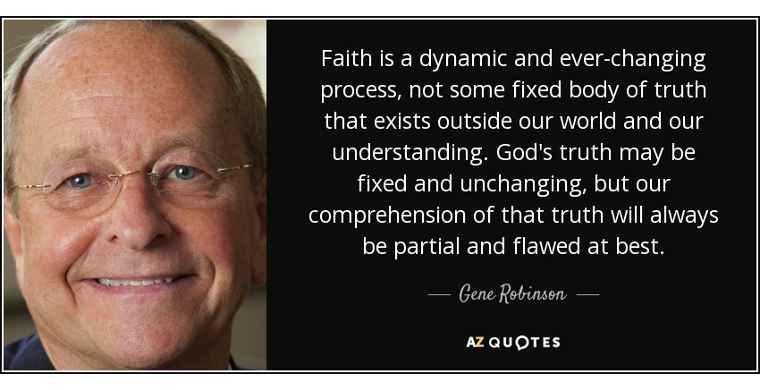'He will Guide us into all truth,' but is it Gene Robinson's understanding of truth?
By David W. Virtue, DD
www.virtueonline.org
March 10, 2021
Retired Episcopal Bishop Gene Robinson, the first openly homosexual bishop in the Episcopal Church, likes to quote a story from the biblical account of the Last Supper.
In Robinson's telling, Jesus says to his disciples, "There is much that I would teach you, but you cannot bear it right now. So, I will send the Holy Spirit, who will lead you into all truth."
"And the question I always ask my brothers and sisters in the conservative denominations," Robinson says, "is, 'Could it be that God is leading us into a deeper truth about gay and lesbian, bisexual, transgender people?' "
First, all religious beliefs do not change over time. That is pure fiction.
Secondly, God has not changed his mind about how we should behave sexually. Scripture cannot be written and then rewritten or redacted to make it mean something else.
"But when he, the Spirit of truth, comes, he will guide you into all the truth. He will not speak on his own; he will speak only what he hears, and he will tell you what is yet to come". John 16:13
Puritan divine John Owen said of this text; "But what does Jesus mean by 'all truth'? He does not mean 'all truth' absolutely. The Holy Spirit's work is not to lead us into all historical, geographical, astronomical and mathematical truth. The Holy Spirit is to lead us into all truth concerning the mysteries of the kingdom of God, of the gospel, of the counsel of God about the salvation of the church by Christ (Acts 20:27). The Holy Spirit will lead us into all truth necessary for faith and obedience (Acts 20:21).
Each believer is led into all the truth necessary to his own state and condition, to enable him to do his duty and work (Eph. 4:7). Christ gives to each according to his measure and needs.
Dr Kirsten Birkett, Theological Consultant to Church Society says of this text:
This verse is taken as reason to expect devout Christians, in conscience, to come to new conclusions about life and doctrine that are different from the received view, perhaps even different from biblical teaching. But is this what Jesus actually taught in John 16:13?
Who is 'you'? The argument turns on who is the 'you' in John 16:13. These chapters are part of what is known as the 'Upper Room Discourse': what Jesus said to the disciples after the Last Supper. He got up and washed their feet; he predicted Peter's denial; and then he taught the disciples about his leaving, and the coming of the Holy Spirit.
"It is true that the Spirit, when he came, came not just to the Apostles who received this direct teaching, but to all people who came to faith in Christ. There also are many parts of the Upper Room Discourse which, although spoken to the Twelve, are applicable to all believers. We should all, for instance, keep Jesus' commandments (14:15). We should all remain in Christ (15:4). We should love one another as Jesus loved us (15:12). Does this mean that the promise of 16:13 is that the Holy Spirit will guide all of us, collectively, into new truths about following Christ?
"No; even though the teachings of the discourse has some secondary applications to all Christians, these particular words in context refer to the Apostles only.
"The Spirit will, in other words, make sure that the Apostles remember what Jesus told them in person, and also reveal to them the further things that they need to know, but cannot yet bear. Once this happened, the Apostles will be able to do what Jesus charged them to do in 15:27 testify. They will write down the teaching of Jesus, and so create the books of the New Testament. Eventually Paul would be added to their number, Jesus sending him as his chosen instrument to proclaim Jesus to the Gentiles (Acts 9: 15), and also writing Scripture, as recognized by the other Apostles."
"None of this suggests that new revelation would be given to the Church in general throughout history, or now," writes Kirsten.
"As a church, we may come to realizations from time to time that an accepted reading of the Bible is wrong. We may need to revise our teaching. There was, for instance, a time when many believed that the Bible taught that the earth cannot revolve around the sun. Eventually it came to be seen that verses such as Psalm 104:5 are a poetic way of referring to God's power, not a specific teaching that the earth can never move through space. It can happen that we read the Bible wrongly; we are limited, and sinful beings, after all. We should always come to Scripture with close attention and prayer, and 'sanctified common sense', as John Stott put it." (For an excellent talk on John 16, by the way, listen to John Stott's 'The Two Comings of Christ', https://urbana.org/urbana-70).
Yet recognizing that we are capable of misreading Scripture is very different from saying that we can discover God's revelation outside of Scripture; or that John 16:13 in any way teaches us to expect revelation through the ongoing discussions of the Church. Jesus did not teach us that we hear his teaching in reflection upon the world around us, or people's lives.
Jesus told us where to find his teaching: in that of his Apostles. He has graciously given us that surety. It is up to us, now, to follow what he did say in the Upper Room Discourse that applies to us now: 'if you love me, keep my commands.'
Gene Robinson is wrong, dead wrong. He is leading people astray when he quotes and misuses Scripture to his own desired, homoerotic ends.
END














